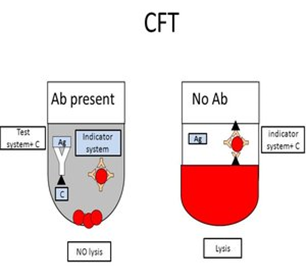What is the full form of CFTCFT: Complement Fixation TestCFT stands for Complement Fixation Test. It is one of the major traditional tests (diagnostic examination of blood serum) used to detect an antibody in a person's blood serum, based on whether fixation occurs or not. CFT is mainly used to diagnose infections. It was introduced by Wasserman in 1909. In the beginning, it was extensively used in syphilis serology. 
Complement is a protein (globulin) present in normal blood serum. It binds to antigen-antibody (Ag-Ab) complex (immune complex) formed during the antigen-antibody reaction. The complement fixation to complex results in lysis of cell, on which the Ag-AB complex is formed. So, when a complement takes part in antigen-antibody complexes, it is fixed or bound to the antigen-antibody complex. When the complex is on bacteria, red blood cells or other cells, the complement causes the lysis of the cells involved. The terminal components of the complement damage the cell membranes in the presence of a specific antibody, which fixes complement to the cell surface. In the CFT, Reb Blood Cells ( erythrocytes) are used as the target cell, as complement induced damage of the cell membrane can be measured as an increase in free hemoglobin. When specific antibodies in response to an infectious agent are present in the blood serum, a complement in the system is bound to the Ag-Ab complex, leaving no residual complement to react with antibodies that belong to the erythrocytes, so hemolysis will not occur. So, the absence of hemolysis confirms the presence of specific antibodies in the blood serum. If hemolysis occurs, it means, the specific antibody is not present in the blood serum. Advantages
Next TopicFull Form
|
 For Videos Join Our Youtube Channel: Join Now
For Videos Join Our Youtube Channel: Join Now
Feedback
- Send your Feedback to [email protected]
Help Others, Please Share










